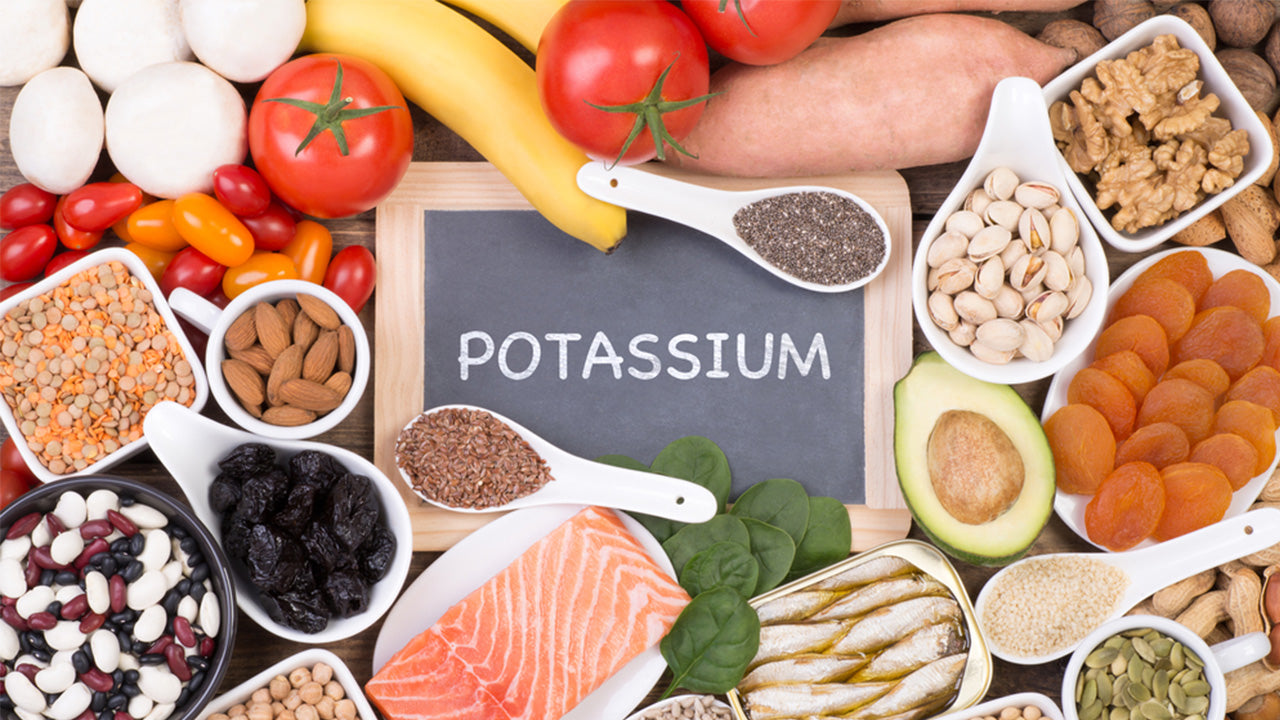What Is Potassium and Why Do We Need It? Plus, 15 Foods High in Potassium
 By: by Amino Science
By: by Amino Science

Can you answer these two questions: what is potassium and why do we need it? We didn’t think so. Chances are, you, like many other people, tragically underestimate the importance of potassium. When dissolved in water, this mineral becomes highly reactive and produces positively charged ions. Because of its special ability to conduct electricity, which makes it necessary for a number of bodily functions, potassium is classified as one of the five essential electrolytes.
Studies have linked an increased intake of foods high in potassium to a variety of impressive health benefits. We’ll cover what potassium is, why we need potassium, how potassium functions in the body, and common signs of a potassium deficiency. Plus we’ll share a list of 15 potassium-rich foods.
What Is Potassium and Why Do We Need It?
Potassium is the third most abundant mineral in the human body. Testing shows that the vast majority of the potassium in your body—about 98%—can be found in your cells. Your muscle cells claim 80% of those potassium stores, while the remaining 20% gets divvied up between your bones, liver, and red blood cells.
Potassium functions as an electrolyte inside your body. Once it’s dissolved in water or another fluid, it disintegrates into positive ions that transmit electrical signals. Your body uses those signals to control a number of important processes.
Potassium is responsible for three primary functions: balancing fluid levels, transmitting nerve signals, and regulating muscle contractions. When potassium levels drop too low, or soar too high, the results can be quite serious.

Key Potassium Function #1: Balancing Fluid Levels
Water accounts for approximately 60% of our body weight as adults. Water exists both inside and outside our cells: the 40% that’s inside our cells is called intracellular fluid (ICF) and the 60% that’s outside our cells in places like the blood, spinal fluid, and space between cells is called extracellular fluid (ECF).
Electrolytes—sodium and potassium in particular—strongly affect the amount of water in both your ICF and ECF. Potassium is the main electrolyte found in your ICF and it determines how much water exists inside your cells at any given time. Sodium plays the same role when it comes to your ECF.
When everything is going right, there’s an equal concentration of electrolytes and stable amounts of water both inside and outside your cells. The technical term for the ratio between electrolytes and fluid is osmolality. The goal is to maintain equal osmolality between your ICF and ECF.
When osmolality becomes unequal, water from the side with fewer electrolytes shifts to the side with more in order to balance out electrolyte levels. As water moves into or out of your cells, it may cause those cells to swell or shrink. In some cases, your cells may even burst.
Regulating fluid balance is a central health concern. Changes in cell volume like we discussed above can have an especially damaging effect on brain cells. When ECF volume drops, it can adversely affect blood flow to organs, including your heart.
Eating a potassium-rich diet, in addition to ensuring you drink enough water to stay properly hydrated, is a crucial part of maintaining balanced fluid levels.
Key Potassium Function #2: Transmitting Nerve Signals
Your nervous system handles communication between your brain and your body. That communication gets transmitted in the form of nerve signals that regulate muscle contractions, heart rhythm, reflexes, and numerous other functions.
Potassium plays a starring role in the nerve signal transmission process. When potassium enters a nerve cell, it begins a sodium-potassium exchange that generates the electrical charge required to transmit a signal. And when it exits a nerve cell, it repolarizes it, allowing the nerve signal to be processed.
The range for healthy blood levels of potassium falls between 3.6 and 5.0 mmol/L. If the level of potassium in your blood falls by as little as 1%, it can set off a serious imbalance. This, in turn, can disrupt the transmission of nerve signals throughout your body.
In order to maintain healthy nervous system function, it’s important to meet your body’s minimum recommended dietary allowance for potassium.
Key Potassium Function #3: Regulating Muscle Contractions
As we touched on above, muscle contractions are one of the functions nerve signals control. Altered potassium levels negatively impact nerve signaling, which throws off muscle contractions, including your heartbeat.
Potassium is so important to muscle health, we include 12 milligrams of it in our athletic performance blend to help increase endurance and reduce post-workout soreness.
Hypokalemia occurs when potassium levels fall too low. Hyperkalemia arises when they rise too high. Both can be dangerous.
The major danger associated with changes to potassium levels is alterations to your heart rhythm. Low levels of potassium can cause arrhythmias, irregular heart beats that can require medical treatment and even surgery. High levels of potassium can cause the heart to weaken and over-dilate, which can also lead to arrhythmias. When your heart fails to beat properly, it also fails to circulate blood to your brains, muscles, and other organs.
According to an article published in Experimental and Clinical Cardiology, “Hypokalemia is associated with increased risk of arrhythmia in patients with cardiovascular disease, as well as increased all-cause mortality, cardiovascular mortality and heart failure mortality by up to 10-fold.” In other words, if you have underlying heart problems, low potassium levels make it 10 times more likely those problems will be fatal.
Hyperkalemia is also strongly associated with a higher risk of death for patients with heart disease as well as those with kidney disease, according to a 2017 study.

Hopefully by now you have a sense of just how important it is to maintain your body’s potassium levels.
However, the National Health and Nutrition Examination Survey (NHANES) conducted by the Centers for Disease Control (CDC) shows that fewer than 2% of adults living in the United States meet the dietary guidelines for potassium intake. While that’s certainly not ideal, it’s unlikely to cause a potassium deficiency.
In most causes, potassium deficiencies arise when the body rapidly loses a large amount of potassium. Typical causes include prolonged vomiting, prolonged diarrhea, or other health conditions or situations that result in the loss of a large volume of fluids.
As the NHANES data may have tipped you off, it’s quite unusual for someone to get too much potassium. There’s no compelling evidence to show that it’s possible to get too much potassium from dietary sources alone, though you could do so by taking an excessive amount of potassium supplements. There have been instances of people taking a larger dose of potassium than their kidneys can process, with sometimes fatal consequences.
Research shows that in most cases, excessively high blood levels of potassium occur when the body struggles to flush the mineral from the body through the urine. Because of this, dangerously high potassium is most likely to affect individuals with impaired kidney function. Certain populations have an increased risk of developing hyperkalemia (concerningly high potassium levels), including:
- Individuals with chronic kidney disease
- Those taking blood pressure medications
- Elderly individuals (kidney function tends to decline as we grow older)
15 Potassium-Rich Foods to Add to Your Diet
Luckily, when it comes to finding potassium in food, you have plenty of options beyond the most famous one: bananas. In fact, bananas aren’t even the most potassium-dense food on our list! Many legumes, nuts, vegetables, fruits, and types of fish contain high levels of potassium.
How much potassium should you be aiming for daily? The World Health Organization (WHO) strongly recommends that adults shoot for a minimum daily intake of at least 3,510 milligrams of potassium from food daily.
Based on information provided by SELF Nutrition Data, we’ve listed the amount of potassium provided by a 100-gram serving of 15 potassium-rich foods. For some foods, we’ve also specified preparation method, since that alters potassium content.

In almost all cases, it’s far better to get your potassium from whole food sources than from over-the-counter (OTC) supplements. As we mentioned above, it is possible to overdose on potassium supplements. Because of that, regulatory agencies such as the U.S. Food and Drug Administration (FDA) limit potassium supplements to less than 100 milligrams. Which, as you can see, is less than half the amount you’d get from a single serving of the foods listed above.
For individuals with true potassium deficiencies, though, doctors can prescribe high-dose supplements. Never take that type of medication unless it’s been prescribed to you and always follow your doctor’s instructions.

Up to 25% off Amino
Shop NowTAGS: food
Join the Community
Comments (0)
Most Craveable Recipes




 833-264-6620
833-264-6620



















